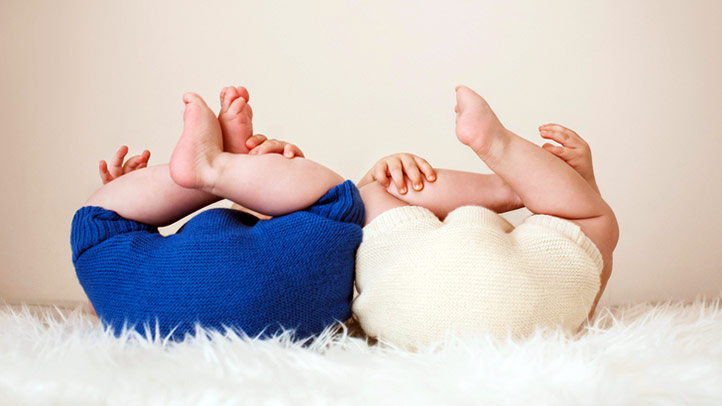
26 May Double Trouble or Twice as Nice? Preparing for Multiples
Finding out that you are a soon-to-be parent of twins is, without question, a game-changer.
There is already plenty to wrap your head around when planning for the arrival of just one baby. So how do you go about preparing yourself for the arrival of two (or more!) little bundles of joy?
We have put together for you a few tips to help start preparing you mentally for life with twins.
Talk to people in the know:
News that you’re expecting multiples can bring with it a wide range of emotions – from incredible joy, euphoria and excitement, to overwhelming feelings of worry and anxiety about the enormous life-changes ahead.
One of the best things you can do when you find out you are expecting multiples is to connect with others who have been through it all before.
“Everybody seems to know of somebody who has had twins – be it somebody in your family or a friend of a friend,” says Andree, a GP and mother to 2-year-old twin girls. “It can be really helpful to make contact with these people, ask questions and listen to what they have to say about their experience.”
Also be on the look out for support groups that are active in your local area. Organisations such as the Australian Multiple Birth Association, and the Australian Breastfeeding Association run local support groups and information sessions around the country for new/expecting parents, and can be a great way to connect with other parents who are raising, or expecting, multiples.
Get online:
There are some terrific online resources for current and soon-to-be parents of twins. The Twins Research Australia website is a great place to start. Twins Research Australia provides helpful information and links to twin resources and research, and also outlines where to find practical support and services – including twin specific psychologists and mental health advice, telephone services and online community groups.
Organise practical help early:
This is a big one. Accept the fact that you are going to need helpers once the twins arrive – be it preparing meals, keeping on top of the washing, cleaning the house, or entertaining older siblings.
As twins expert Dr. Joan A. Friedman puts it: “It is imperative that you ask for help when you have twins because you are going to be faced with overwhelming physical and emotional responsibilities.
“It is important to recognise that getting help is not a sign of weakness or a sign of inadequacy. You are actually doing your children a favour. By freeing yourself up from these other tasks, you are able to spend much more time with your babies.”
Kathryn, a working mother of 14-month-old twin boys, couldn’t agree more: “Do anything you can to make your life easier – like hiring a cleaner or getting a family member to come and help out.”
Be sure to sort out your helpers sooner rather than later.
“Organise it well before the twins arrive,” advises Kathryn. “You don’t want to waste time finding a good cleaner, for example, amongst all the other madness that is going on!”
You may also want to look into hiring a nanny or mother’s helper to help take the pressure off, especially if ongoing support from family is not an option.
Be mindful of your relationship with your partner:
All relationships are impacted by the arrival of a new baby. This is especially true after the birth of twins.
Mother of twin girls and founder of TwinsUK, Delyth Raffell, says that the brutal combination of sleep deprivation and stress wreaked havoc on her relationship with her partner in the early days of parenthood.
“Having twins placed an enormous strain on our relationship even though we had been together for 20 years,” she says. “You hear how having one baby is a life-changing experience – but having two places even more pressure on your relationship as it does feel like a relentless cycle of nappy changing, feeding, crying [and] washing with no end in sight and even the smallest things can be blown up out of all proportion due to lack of sleep and stress.”
Kathryn agrees. “Accept that you and your partner will argue. You are both tired and stressed and will snap at each other. Try not to take it personally – my husband and I fought more in the first month of parenthood than in the entire 11 years we had been together!”
Preparing older siblings:
If you have children already, the arrival of baby twins will have a significant impact on existing family dynamics.
Think about how you can involve your children in preparing for the new arrivals. Seek out children’s books about bringing home a new baby and have conversations about what it means to become a big brother or sister. Buy “twin” dolls for your children to “look after” in the lead up, and spend time with other families who have younger twins if you can.
Dr. Friedman says it is normal for older siblings to display regressive behaviour once the new babies arrive. Maybe a child that was not using nappies will start using nappies again. Or a child that was off the bottle might ask for a bottle again.
“Allow them to regress if they need to and also allow them to express any negative feelings,” she explains.
Dr. Friedman also suggests planning for quality alone time with the older siblings once the twins arrive. “This is what will really make them feel special and also help facilitate the transition.”




